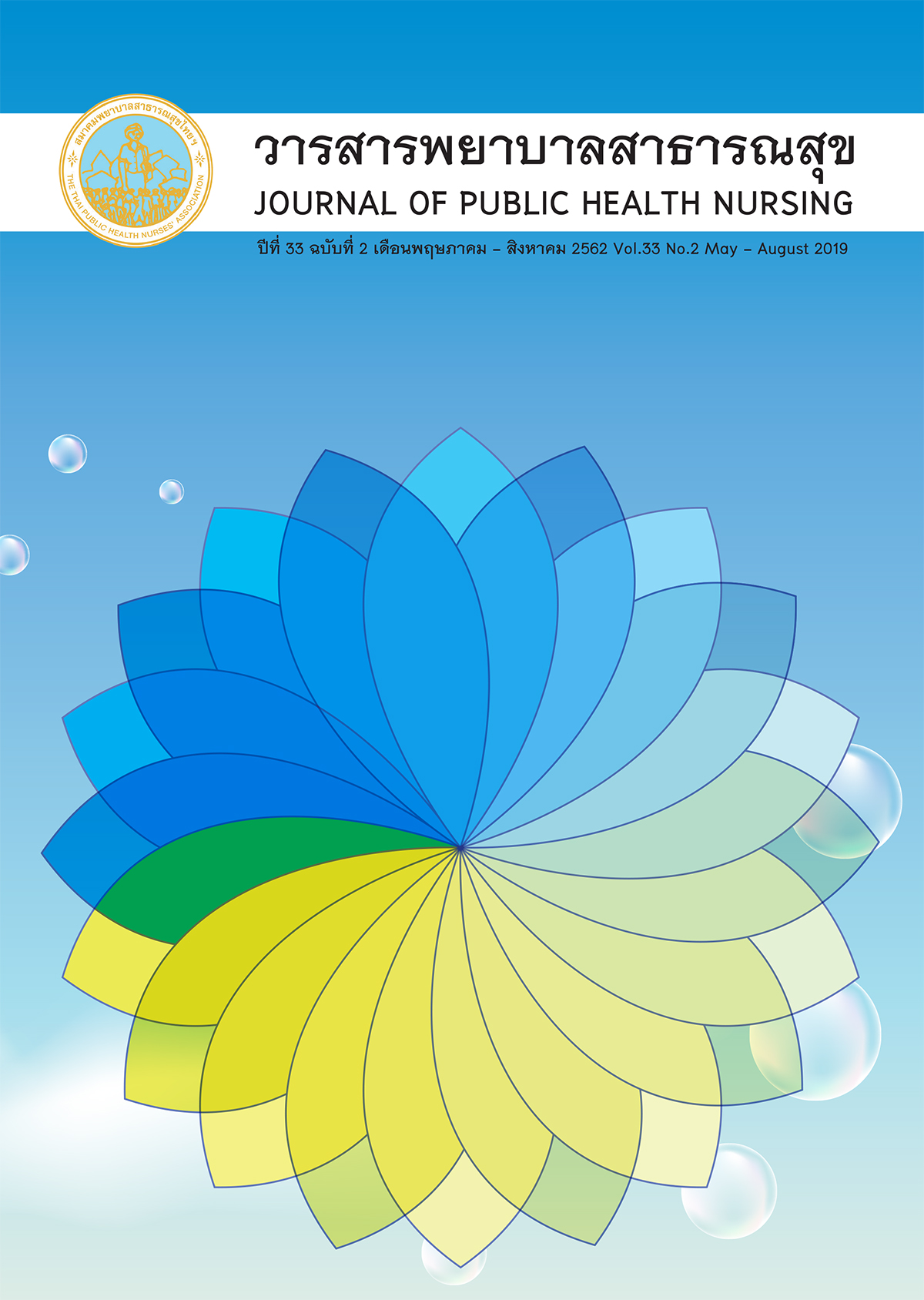FACTORS RELATED TO SMOKING CESSATION OF CLIENTS IN SMOKING CESSATION CLINIC IN PUBLIC HEALTH CENTER BANGKOK
Keywords:
QUITTING SMOKING, CLIENTS OF SMOKING CESSATION CLINIC, BANGKOKAbstract
Smoking is a health problem that affects the individual, family and community. This study investigated factors related to smoking cessation of clients in a smoking cessation clinic in a public health center in Bangkok. This study used a cross sectional design of two hundred clients selected by stratified random sampling in 2555 (2011). Data were collected by questionnaire and from medical records. Statistical representation and analysis included percent, mean, standard deviation, Chi-square and binary logistic regression.
Results found that 25.5% of the clients had succeeded in quitting smoking for more than six months. The factors associated with success were haven taken the full course of medicine and number of times haven visited the smoking cessation clinic. The probability of smoking cessation in clients who took the full course of medicine was 27.53 times (OR =27.53, 95 % CI = 3.35 – 226.30) that for clients who took medicine sometimes or never, while the clients who visited the smoking cessation clinic more than 5 times were 6.30 times (OR = 6.30, 95% CI = 2.93 – 13.52) more likely to quit smoke than those that visited the clinic 5 or fewer times. This result shows the importance of health officers emphasizing adherence to medication and clients making scheduled visits to the smoking cessation clinic for successful quitting.
References
World Health Organization. Global health Observatory (GHO) data: second-hand Smoke [Internet]. 2017 [Cited 2019 Sep 10]. Available from http://who.int/gho/phe/SecondhandSmke/en/.
Center for Disease Control and Prevention. Health effects of cigarette smoking [Internet]. 2017 [Cited 2019 Sep 10]. Available from http://cdc.gov.tobacco/data_Statistics/factsheet/healtheffects/effects_cig_smoking/index.htm.
Vathesatokit P, Charoenca N. Tobacco control: Lessons learnt in Thailand. Indian Journal of Public Health 2011; 55(3): 228-33.
National Statistic Office. The survey of smoking and drinking behavior of the population 2014 [Internet]. 2018. [Cited 2019 Sep 10]. Available from http://www1.health.gov.au/internet/publication/publishing.nsf/Content/tobacco-control-toc-smoking-rate.
Health Intervention and Technology Assessment Programe. Good to know about health screening [Internet]. 2019. [Cited 2019 Sep 17]. Available from http://www.mycheckup.in.th/hitap/article_view.php?txtID=24.
World Health Organization. WHO report on the global tobacco epidemic: the MPOWER package. Geneva; 2008. p. 342 .
Tipyawong T, Ratanasaeng P. Smoking cessation services system in Thailand. Department of Medical Services Journal 2015; 40(2): 94-102.
Rungruanghiranya S. SMART Quit Clinic program. Bangkok; 2011. p. 132.
Public Health Department, Bangkok Metro Politan Administration. Statistic report client in Pubilc Health Centers [Internet]. 2011 [Cited 2019 Sep 10]. Available from http//203.155.220.215/healthsite/web2013/about6(Thi).php.
Pitayarangsarit S, Sommit K, Aium A-nun P. Situation of tobacco consumption by province In Thailand 2011. Bangkok; Healthwork; 2012. p. 104.
Green LW, Kreuter MW. Health program planning: An educational and Ecological approach. New York : Mc Graw Hill; 2005.
Daniel WW. Biostatistics: A foundation for analysis in the health sciences. 8thed. USA: John Wiley & Sons; 2005. p.780.
Thammasat University Hospital. Cigarrette clinical statistics report at health promotion. Journal of Public Health Nursing 2016; 32(2): 137-53. (in Thai)
Nuchsongsin F, Chatdokmaiprai k, Pitayarangsarit S. Smoking cessation interventions in the workplace: a review. Journal of Health Science 2018; 27(1): 67-75.
Burke MV, Hays JT, Ebbert JO. Varenicline for smoking cessation: a narrative review of efficacy adverse effects, use in at-risk populations, and adherence. Patient Prefer Adherence 2016; 10: 435-41.
Fiore MC, Bailey WC, Cohen SJ, et al. Treating tobacco use and dependence. AM J Prev Med 2008; 35(2): 158-76.
Weinberger AH, Krish-Sarin S, Mazure CM, McKee SA. Relationship of perceived risks of smoking cessation to symptoms of withdrawal, craving, and depression during short-term smoking abstinence. Addictive behaviors 2008; 33(7): 960-3.
Downloads
Published
How to Cite
Issue
Section
License
บทความที่ตีพิมพ์และแผนภูมิรูปภาพถือเป็นลิขสิทธิ์ของวารสารพยาบาลสาธารณสุข (Thai Public Health Nurses Association)







